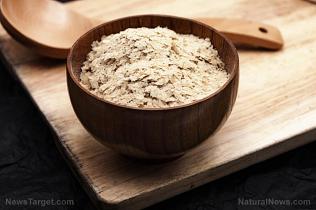A high-fiber diet may help reduce inflammation linked to COVID-19, study suggests
(Natural News) Up to 50 percent of patients with COVID-19 report experiencing gastrointestinal problems, such as abdominal pain and diarrhea. Research also shows that patients tend to have lower levels of gut bacteria that make short-chain fatty acids (SCFAs) by fermenting fiber from foods. SCFAs play a key role in maintaining the integrity of the intestinal barrier. They also regulate immune cell function.
A recent study showed that colon and intestinal epithelial cells treated with SCFAs reduced the expression of a gene that encodes a key viral receptor and of interferon-beta (IFN-beta), a type of cytokine that favors inflammation.
Cytokines are small proteins released by specific cells of the immune system. They trigger symptoms like fever, runny nose, aches and inflammation in the event of a viral infection. But too many cytokines can result in a “cytokine storm,” which is implicated in the prevalence of severe COVID-19 outcomes, including death.
The findings appeared online in the journal Gut Microbes.
SCFAs don’t change viral load but affect expression of genes, proteins involved in infection
Research suggests that alterations in gut microbiota and its products can modify an infected subject’s immune response. According to co-author Patricia Rodrigues from the University of Campinas in Brazil, previous animal studies showed that compounds produced by gut microbiota, such as SCFAs, helped protect organisms from respiratory infections.
To confirm whether SCFAs produced by gut bacteria affect the infection of intestinal cells by SARS-CoV-2, the virus that causes COVID-19, Rodrigues and her colleagues infected colon tissue samples from healthy patients and intestinal epithelial cells with the virus. The tissues and cells were then treated with a mixture of butyrate, acetate and propionate, which are the most abundant SCFAs.
The results showed that treating the tissues and cells with the SCFA mixture did not alter their viral loads. The treatment also did not affect cell wall permeability and integrity.
However, the team found that treated tissues and cells showed a marked decrease in the expression of DDX58, a gene that encodes a key viral receptor called retinoic acid-inducible gene I (RIG-I).
The treatment also resulted in a decrease in the expression of TMPRSS2, an endothelial cell surface protein. It is involved in the entry and spread of coronaviruses, including SARS-CoV-2. Recent studies suggest that blocking TMPRSS2 may be an effective clinical therapy for COVID-19.





